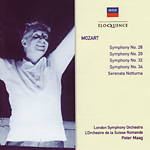Once you get past the boxy, tubby mono sound afforded Symphonies 28, 29, & 34 (assuming you can get past it), you have to contend with the perniciously out-of-tune orchestral playing. The early 1950s was not an exemplary period for the Orchestre de la Suisse Romande, as these recordings certainly prove. The intonation problems are bad enough, but the strings suffer from periodic lack of ensemble–most egregiously in Symphony No. 28’s finale, where they can’t manage Mozart’s articulations at Peter Maag’s not unreasonably swift tempo. As for Maag, he interprets Mozart in his usual energized and sensitive manner, an approach that gets sabotaged by the ragged orchestral execution.
Hearing the warm, full stereo sound for Symphony No. 32 is like going from the TV monitor in the lobby to a seat inside the concert hall. The London Symphony provides immeasurably superior playing for this work as well as for the Serenata notturna, which features impressive solo playing by Hugh Maguire and Neville Marriner on violins, Simon Streatfield on viola, and Stuart Knussen on double bass. Fine as these last two performances are, being shackled to the earlier bunch significantly diminishes their desirability and makes the CD as a whole of interest only to devoted Maag fans.
































